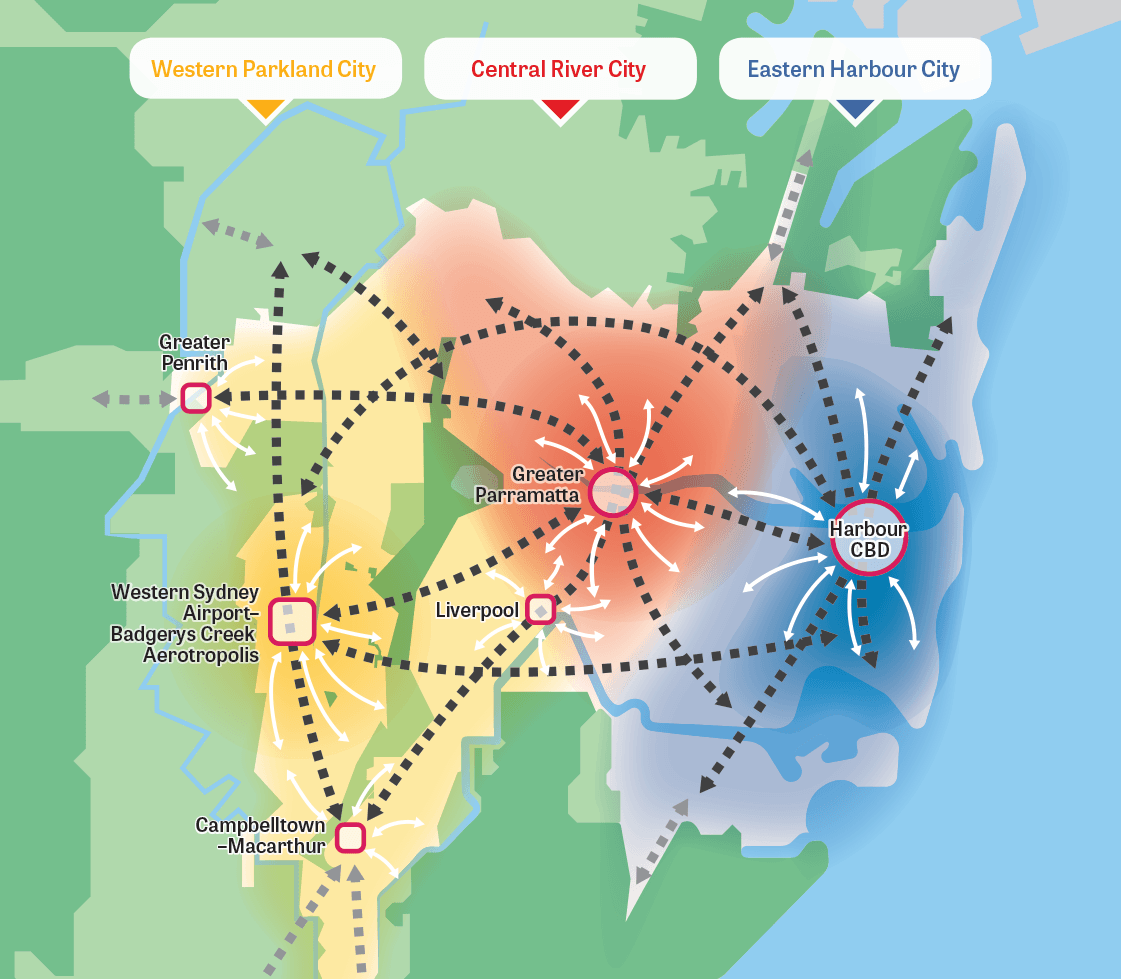Was 'Greater Sydney' Coined for Covid-19?
Since the start of the Covid-19 Pandemic in 2020 the NSW State Government has referred to a collective number of Sydney Suburbs as ‘Greater Sydney’. Was it coined for transparency surrounding lockdown measures? No it was not.

The Greater Sydney Commission
The Greater Sydney Commission, founded in 2015, is leading metropolitan planning to make Greater Sydney more productive, sustainable and liveable. Greater Sydney is growing fast. Population projections suggest that the region will be home to about 1.6 million more people over the next 20 years. To meet the needs of a growing and changing population the vision seeks to transform Greater Sydney into a metropolis of three cities:
- The Western Parkland City
- The Central River City
- The Eastern Harbour City.
The vision brings new thinking to land use and transport patterns to boost Greater Sydney’s liveability, productivity and sustainability by spreading the benefits of growth. The commission’s role is to coordinate and align the planning that will shape the future of Greater Sydney. They’re taking a collaborative "one government" approach to this to lead and guide the planning for development, transport and housing so that Greater Sydney will be a productive, liveable and sustainable city for all.
On 24 October 2018 the NSW Parliament passed amendments to the Environmental Planning and Assessment Act 1979 and the Greater Sydney Commission Act 2015. The legislative changes support the Commission to have a more strategic oversight and assurance role at the centre of Government.
Key elements of the amended legislation:
- require councils in the Greater Sydney Region to obtain the written advice of the Commission that it supports a local strategic planning statement before it is made by the council;
- require the Minister for Planning to refer a planning proposal for a Local Environmental Plan to the Commission for advice about whether or not it supports the proposal if it significantly affects implementation of the Greater Sydney Region Plan or applicable District Plan;
- require the Minister for Planning to consult with the Commission on State Environmental Planning Policies that will, in the Minister’s opinion, significantly affect the implementation of the Greater Sydney Region Plan or applicable District Plan; and relieve the Commission of its statutory local plan-making functions.
- give the Commission new advice and assurance functions, including directly advising the Minister for Planning on request, with the Commission being able to make reasonable requests for information from agencies and councils for the purposes of exercising its functions.
A Metropolis of Three Cities
A Metropolis of Three Cities is a plan that responds to the needs of Greater Sydney’s people and the region’s current and future structural challenges. A Metropolis of Three Cities reflects the settlement patterns, unique geography and growth pressures that need to be addressed if the region is to achieve its potential. These challenges include:
- An imbalance in access to jobs created by the Harbour CBD located on the eastern edge of Greater Sydney – its concentration of 500,000 jobs is reinforced by its radial rail network and by the concentration of economic activity over the past 30 years with office precincts, universities and biotech clusters to the north and south along the Eastern Economic Corridor.
- The geography of the Sydney Basin including its waterways, ridges and the ring of national parks that frame the Basin, and limit the spatial extent of Greater Sydney. The ridges and ravines in particular, impede the development of roads and rail and in some areas significantly constrain accessibility.
- An historic car-based suburban form, which significantly influenced the pattern of growth in much of the western parts of Greater Sydney.
- Shifting demographics, with a greater proportion of older people in the central and western parts of the region, an increase in the number of children across the region, and a decline in the population of people of working age, leading to greater pressure for access to health and education services.
- Significant differences in the landscape, climate and amenity across the region – from the cooler eastern areas to the west which has many more hot days, low rainfall and less tree canopy cover.
Also, advances in technology are increasingly changing how cities operate, from freight, retail, and personal transport choices to how information is disseminated, influencing how and where people work and how goods and services are accessed. Some manufacturing and distribution of goods are shifting to a smaller and medium scale, emphasising the role of local industrial and urban services land.
Stay-at-home Restrictions
Public Health (COVID-19 Additional Restrictions for Delta Outbreak) Order (No 2) 2021 claims that the basis for concluding that a situation has arisen that is, or is likely to be, a risk to public health is as follows —
(a) public health authorities both internationally and in Australia have been monitoring and responding to outbreaks of COVID-19, which is a condition caused by the severe acute respiratory syndrome coronavirus 2 (SARS-CoV-2);
(b) COVID-19 is a potentially fatal condition and is highly contagious; and
(c) a number of cases of individuals with COVID-19 have recently been confirmed in New South Wales and other Australian jurisdictions, including by means of community transmission, and there is an ongoing risk of continuing introduction or transmission of the virus in New South Wales.
Based on the above, Brad Hazzard the NSW Minister for Health and Medical Research made Orders under Section 7 of the Public Health Act 2010 (NSW) of movement restrictions on NSW citizens residing in Local Government Areas considered to be areas of concern in relation to ongoing risk of community transmission of the Covid-19 virus in NSW. The movement restriction order limits certain NSW citizens from travelling outside a 5km radius centred at their place of residence. This Public Health Order is based on the presumption that Covid-19 is a potentially fatal condition and is highly contagious, absent of scientific evidence showing the level of risk threatening Public Health.
There is no scientific research to support the efficacy Public Health Orders (PHO's) whether they'd be lockdown/restrictions or mandatory mask wearing. The PHO's are merely precautionary measures to mitigate just how the fatal the virus might be, for some reason yet to be ascertained when the first SARS virus of 2003 was re-created and patented months after its discovery. So, if the PHO's have no bearing on the rate of infection then what warrants the disruption of everyday normalcy? The PHO's create the need for implementing the plans developed by the Greater Sydney Commission. Restricting movement presents the NSW Government with an opportunity to monitor civilian activity within their respective local government areas, assisting the Greater Sydney Commission to improve or restructure the decision-making process so that consideration of socio-economic and environmental issues is fully integrated and a broader range of public participation assured.
The United Nation's Agenda 21 report advises member states to support a more integrated approach to decision-making, the data systems and analytical methods used to support such decision-making processes may need to be improved. Governments, in collaboration, where appropriate, with national and international organisations, should review the status of the planning and management system and, where necessary, modify and strengthen procedures so as to facilitate the integrated consideration of social, economic and environmental issues.
Covid Impacts on Greater Sydney
Working From Home
In City-Shaping Impacts Of Covid, the commission provides that analysis has found that COVID-19 is accelerating existing trends. For example, with 47 per cent of Greater Sydney’s employees able to work from home, the uptake of digital technology has accelerated as pressure is reducing on the transport system. The increase in people working from home means more people are accessing services in local centres. The increase in time consumers spend in local centres since the pandemic began is greater than in strategic and metropolitan centres. This highlights the importance of vibrant local centres and high streets.
If high levels of working from home continue, there could be more people spending more money and time in their local area. People value the time they save by not commuting and many use that time for leisure. A further component of the increased consumer spending in local communities is the increase in deliveries to the home for food and online purchases. To optimise the benefits of people working from home, such as increased local spending and more leisure time, businesses would need greater investment in technology to support remote working.
Smart Cities
The increase in e-commerce and online sales, a 700 per cent increase in tele-health services and large-scale increases in collaborative work and social platforms since the pandemic was declared and a 300 percent increase in library e-loans illustrate how the pandemic is accelerating the digitisation of all areas of life.
Over the last 10 years the proportion of households in NSW with access to the internet increased from around 70 per cent to around 85 per cent across all categories of households. As universal access to fast, reliable, affordable digital technology becomes essential, so too does building the community’s capability to use digital services.
The pandemic is accelerating the sharing of data but has also exposed where systems need to be improved. The NSW Government’s commitment to smart places, expressed through the Smart Places Strategy, uses live and near-time data and insights to drive decisions. Data is gathered through a network of sensors and technologies embedded in the built and natural environment. Emerging initiatives like the Smart Western City Program are designed to support place-based smart interventions. This may include smart pole networks with public wi-fi to improve connectivity in public spaces and making greenfield sites “smart” from the start.
Opinion
The above is a brief overview on the role of the Greater Sydney Commission in planning and actualising the future of Sydney Metropolitan areas. The role extends to consulting with local councils on their proposed development plans to ensure that the plans coincide with the commission’s future outlook for Sydney Metropolis. Speaking on the Future of Greater Sydney in their “A Metropolis of Three Cities” report, the Greater Sydney Commission explained that “Rapid technological change is inevitable, particularly around key areas of access and mobility and in creating a lower carbon future. Electric and autonomous vehicles, robotics, drones, artificial intelligence, battery storage, automation, computing speed and device connectivity will change how residents live and, in turn, the shape of the region.” Since the beginning of the Covid-19 pandemic, especially during lockdown, people around the world found themselves in a predicament demanding the use of technology to work, study, consult with a doctor, shop and socialise. This heavy reliance on technology is synonymous with the commission’s projection of the inevitable increase in technology and to facilitate that is a crucial facet in building a more sustainable and productive future for Greater Sydney.
I can’t stress enough how important it is for the world to look at Covid-19 as more than just a virus. The Greater Sydney Commission provided a plan for Sydney's future that happened to align with life under lockdown years before the Covid pandemic hit. This is no coincidence, your NSW State politicians mention ‘Greater Sydney’ in their daily Covid updates. They know exactly what they are up to, they’re lying to your face. They are over-exaggerating the seriousness of Covid and the masses are eating it up like their lives depend on it. Covid is not severe to the point of demanding a change in lifestyle. People need to get a grip and realise that they’ve succumbed to Covid-like symptoms throughout their entire lives and will inevitably experience them in the future.
You didn’t ask for your life to be solely dependent on technology, yet it seems like your life is going down that path. You have absolutely zero input into how you think your life should be lived. For example, what knowledge on the Greater Sydney Commission did you have before reading this article? None most likely. If you zone out of your mind the Covid-19 hysteria incited by the media, how dangerous would Covid-19 then seem? Not worth your concern I bet.
Source: Clip from August 16 2021 NSW COVID-19 Daily Update Conference
Related articles:
Israel Shaping Greater Sydney's Future
Covid-19 Hysteria and Government Subversion
Article by Adham Tebbie
Click or Tap on Opinions for more articles by Adham.
News Feed






